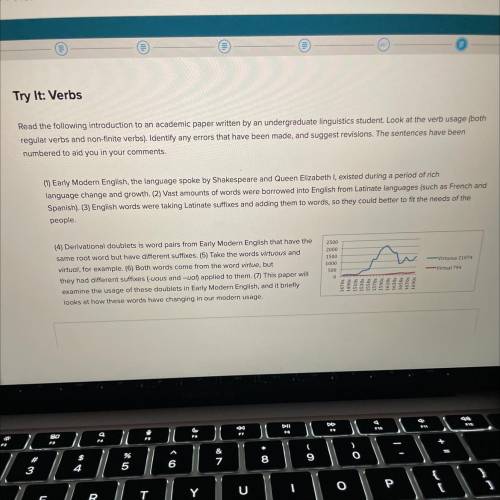
English, 25.08.2021 09:40 ashley24109
Try It: Verbs
Read the following introduction to an academic paper written by an undergraduate linguistics student. Look at the verb usage (both
regular verbs and non-finite verbs). Identify any errors that have been made, and suggest revisions. The sentences have been
numbered to aid you in your comments.
(1) Early Modern English, the language spoke by Shakespeare and Queen Elizabeth I, existed during a period of rich
language change and growth. (2) Vast amounts of words were borrowed into English from Latinate languages (such as French and
Spanish). (3) English words were taking Latinate suffixes and adding them to words, so they could better to fit the needs of the
people.
(4) Derivational doublets is word pairs from Early Modern English that have the
same root word but have different suffixes (5) Take the words virtuous and
virtual, for example. (6) Both words come from the word virtue, but
they had different suffixes (-uous and -ua) applied to them. (7) This paper will
examine the usage of these doublets in Early Modern English, and it briefly
looks at how these words have changing in our modern usage.
Virtual 794


Answers: 2


Another question on English

English, 21.06.2019 17:50
The date of a business letter is included in the greeting. heading. inside address. margin.
Answers: 2

English, 21.06.2019 19:30
By comparing part 1 and 2 of polar opposites what does it mean by polar opposites
Answers: 1

English, 21.06.2019 20:30
Multiple ! in this excerpt from act i, scene vi, of macbeth, duncan praises the atmosphere in the castle and the hospitality of his hostess. identify two reasons that these comments are ironic. duncan: this castle hath a pleasant seat: the air nimbly and sweetly recommends itself unto our gentle sense. . . (enter lady macbeth.) duncan: see, see, our honour'd hostess! — the love that follows us sometime is our trouble, which still we as love. herein i teach you how you shall bid god ild us for your pains, and us for your trouble. he will meet his death in the castle, which he considers a pleasant place. his praise for inverness and his hostess, lady macbeth, is deceptive. duncan secretly plans to give macbeth's title to donalbain. the hostess he praises is actually plotting his murder.
Answers: 2

English, 22.06.2019 10:40
How did you describe raphael in your response? check all that apply. (article is raymond's run). 1 . he is afraid to lose. 2 . he does not play fair. 3 . he psychs the others to get an advantage. 4 . he is not as fast as squeaky.
Answers: 1
You know the right answer?
Try It: Verbs
Read the following introduction to an academic paper written by an undergraduate lin...
Questions


English, 10.11.2019 19:31

Social Studies, 10.11.2019 19:31


History, 10.11.2019 19:31



Mathematics, 10.11.2019 19:31


Social Studies, 10.11.2019 19:31

Biology, 10.11.2019 19:31

Mathematics, 10.11.2019 19:31

History, 10.11.2019 19:31


Computers and Technology, 10.11.2019 19:31


History, 10.11.2019 19:31

History, 10.11.2019 19:31


Biology, 10.11.2019 19:31



